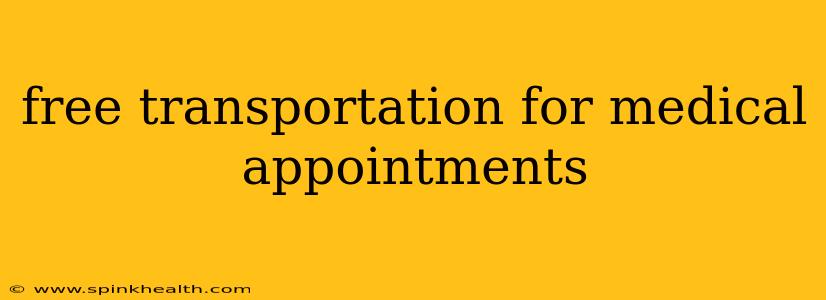Navigating the Journey: Finding Free Transportation to Medical Appointments
The journey to a medical appointment can sometimes feel like a hurdle in itself. For many, the cost and logistics of transportation pose significant barriers to accessing vital healthcare. But what if I told you there are resources available that can help alleviate this burden? Let's explore the landscape of free transportation options for medical appointments, uncovering the pathways to easier and more accessible healthcare.
My own experience with this issue sparked my interest. A family member faced significant challenges getting to regular dialysis appointments, a struggle that highlighted the urgent need for reliable, affordable transportation solutions. This personal connection fuels my commitment to sharing this information, helping others navigate the complexities of healthcare access.
What are some programs that provide free transportation to medical appointments?
This is a question many people ask, and the answer varies depending on your location and specific circumstances. Several organizations offer assistance, including:
-
Local Hospitals and Clinics: Many hospitals and larger healthcare systems have partnerships with transportation providers or offer their own internal programs to help patients get to appointments. Check directly with the facility scheduling your appointment. They are often the best first point of contact. Sometimes they may even be able to coordinate transportation with other services, like social work departments.
-
Non-profit Organizations: Numerous non-profit organizations are dedicated to providing transportation assistance to individuals in need. These organizations often have specific eligibility requirements, such as low income or a diagnosed disability. A quick online search for "free medical transportation [your city/state]" will reveal local resources.
-
Volunteer-Driven Programs: Many communities have volunteer-based transportation programs that rely on the generosity of local drivers. These services might be faith-based, community-based, or part of a larger social services network. These are often less formally structured than hospital or non-profit programs, so expect a wider range of availability and requirements.
-
Government Programs: Depending on your specific circumstances, you might be eligible for transportation assistance through government programs such as Medicaid or Medicare. These programs often have eligibility requirements and may require additional documentation. Contact your local social services agency for guidance.
How can I find free transportation for a medical appointment near me?
Finding the right service often requires a bit of detective work. Here’s a suggested strategy:
-
Start with your healthcare provider: As mentioned before, this is the most straightforward approach. Your doctor's office or the clinic scheduling your appointment is your first line of defense. They often have lists of local transportation resources or can help you navigate the application process for relevant programs.
-
Utilize online search engines: A targeted search using keywords like "free medical transportation [your city/state]" or "medical transportation assistance for seniors [your city/state]" will yield a wealth of local options. Remember to check the websites of local hospitals, clinics, and non-profit organizations.
-
Contact your local Area Agency on Aging (AAA): The AAA is a fantastic resource for seniors, often providing information on various services, including transportation. They often have a well-established network of local providers and can offer personalized recommendations.
-
Explore community resources: Check with local churches, community centers, and social service agencies. These organizations often have strong ties to the community and can provide referrals to relevant transportation services.
What are the eligibility requirements for free medical transportation?
Eligibility criteria vary widely depending on the program. Some programs prioritize individuals with low incomes, while others focus on people with disabilities or specific health conditions. Age is sometimes a factor. Income verification, proof of disability, or medical documentation may be required. It’s crucial to contact the specific organization directly to understand their requirements.
Is there a national program for free medical transportation?
Unfortunately, there's no single, nationwide program providing free medical transportation. The availability of such services is largely dependent on local and regional initiatives. However, many national organizations advocate for improved healthcare access and may be able to provide referrals or guidance on finding transportation resources in your area.
Navigating the system to find free transportation to medical appointments may require some legwork, but it’s undoubtedly worthwhile. Remember, access to healthcare shouldn't be limited by transportation challenges. By proactively seeking out resources and utilizing the strategies outlined here, you can pave the way for smoother, more accessible healthcare journeys for yourself or a loved one. The journey may be challenging, but the destination – improved health and well-being – makes the effort undeniably worthwhile.

